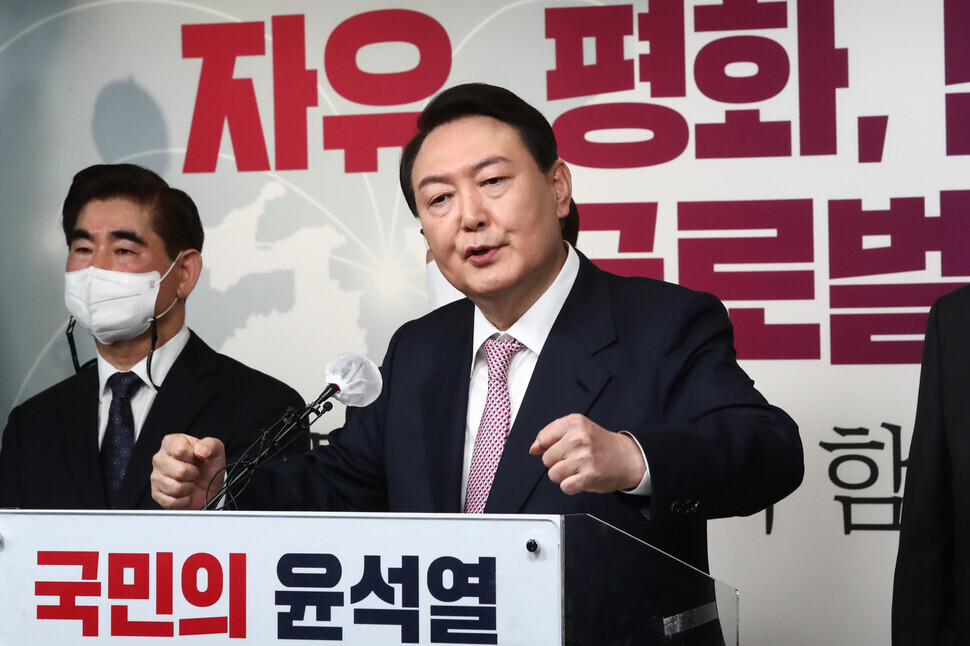hankyoreh
Links to other country sites 다른 나라 사이트 링크
Vision 3000 redux? Yoon’s N. Korea policies hearken back to Lee Myung-bak

People Power Party presidential nominee Yoon Suk-yeol said Monday that the current administration’s Korean Peninsula peace process has “completely failed,” while announcing security and diplomatic pledges focused on deterring North Korea. Some, however, are noting that Yoon’s North Korea policies are reminiscent of the failed foreign and security policies of the Lee Myung-bak and Park Geun-hye administrations.
That day, Yoon announced pledges including the resumption of joint military exercises with the US and the “normalization" of the Terminal High Altitude Area Defense (THAAD) base in Seongju, North Gyeongsang Province.
On Monday, Yoon held a press conference at his party’s headquarters in Seoul at which he pledged to “rebuild the Korea-US alliance, which has collapsed over the past five years.” There, he made pledges regarding the denuclearization of and prosperity for the Korean Peninsula, rebuilding and strengthening the strategic alliance between the US and Korea, and strengthening of areas including the economy, security and diplomacy.
“Have you ever seen a military that doesn’t conduct training or that doesn’t practice?” Yoon asked the audience at the event.
Yoon said that he would “further strengthen the operability of the Korea-US extended deterrence system” known as the nuclear umbrella by “operating the Extended Deterrence Strategy and Consultation Group” and by “developing strategic assets” such as strategic bombers, aircraft carriers, nuclear submarines and more.
The Moon Jae-in administration said it would restore the joint military exercises, which were shortened in time and scale for the sake of promoting the Korean Peninsula peace process.
Yoon, however, is emphasizing that he “will build peace through strength, not through words.”
Yoon defined the Moon Jae-in administration’s North Korea policy as a failure. “The Democratic Party’s ‘Korean Peninsula peace process’ has completely failed,” Yoon said. “The Democratic Party is rushing to declare an end to the war while not taking into account the denuclearization of North Korea, which is a prerequisite for peace and security on the Korean Peninsula,” he added.
“We will devise all means to deter North Korea’s nuclear and missile threats, such as strengthening the capabilities of the Kill Chain, the Korea Air and Missile Defense and the Korea Massive Punishment and Retaliation,” he said.
Regarding the three inter-Korean summits held during the Moon Jae-in administration, Yoon said, "The use of foreign policy in domestic politics the mixture of foreign and domestic policy and the use of inter-Korean and unification issues are all a show."
“I don’t do shows,” Yoon added.
That is, according to Yoon, the inter-Korean summits were political “shows” put on out of domestic political necessity.
Yoon, however, made no mention of the issue of transferring wartime operational control of forces from the US to South Korea. Regarding this issue, he said, “In order to have operational command in a joint [South Korean and US] operation, it is necessary to acquire information through reconnaissance assets and to have some degree of missile defense capability.”
Yoon's hard-line stance seems to be in line with his comments about a preemptive strike against the North.
Yoon also mentioned a “denuclearization roadmap” that would provide economic support if North Korea takes practical steps towards denuclearization. However, critics point out that it is similar to the failed policies of the Lee Myung-bak and Park Geun-hye administrations of “denuclearization first” and “improving inter-Korean relations later.”
According to one professor of international politics, “Until complete and verifiable denuclearization is achieved, the promise to maintain sanctions against North Korea and promote economic cooperation in line with progress toward denuclearization is reminiscent of the Lee Myung-bak administration’s North Korea policy initiative, ‘Vision 3000.’”
Lee’s “Vision 3000” policy was criticized because it lacked details regarding policies that should be implemented before denuclearization. In reality, the Lee Myung-bak administration’s North Korea policy was missing any real content on improving inter-Korean relations.
By Oh Yeon Seo, Kwon Hyuk-chul and Lee Je-hun, senior staff writer
Please direct questions or comments to [english@hani.co.kr]

Editorial・opinion
![[Column] Season 2 of special prosecutor probe may be coming to Korea soon [Column] Season 2 of special prosecutor probe may be coming to Korea soon](https://flexible.img.hani.co.kr/flexible/normal/500/300/imgdb/original/2024/0426/3317141030699447.jpg) [Column] Season 2 of special prosecutor probe may be coming to Korea soon
[Column] Season 2 of special prosecutor probe may be coming to Korea soon![[Column] Park Geun-hye déjà vu in Yoon Suk-yeol [Column] Park Geun-hye déjà vu in Yoon Suk-yeol](https://flexible.img.hani.co.kr/flexible/normal/500/300/imgdb/original/2024/0424/651713945113788.jpg) [Column] Park Geun-hye déjà vu in Yoon Suk-yeol
[Column] Park Geun-hye déjà vu in Yoon Suk-yeol- [Editorial] New weight of N. Korea’s nuclear threats makes dialogue all the more urgent
- [Guest essay] The real reason Korea’s new right wants to dub Rhee a founding father
- [Column] ‘Choson’: Is it time we start referring to N. Korea in its own terms?
- [Editorial] Japan’s rewriting of history with Korea has gone too far
- [Column] The president’s questionable capacity for dialogue
- [Column] Are chaebol firms just pizza pies for families to divvy up as they please?
- [Column] Has Korea, too, crossed the Rubicon on China?
- [Correspondent’s column] In Japan’s alliance with US, echoes of its past alliances with UK
Most viewed articles
- 1Samsung subcontractor worker commits suicide from work stress
- 2Division commander ordered troops to enter raging flood waters before Marine died, survivor says
- 3‘We must say no’: Seoul defense chief on Korean, USFK involvement in hypothetical Taiwan crisis
- 4No good, very bad game for Korea puts it out of Olympics for first time since 1988
- 5[Column] Season 2 of special prosecutor probe may be coming to Korea soon
- 6[Editorial] Korea’s surprise Q1 growth requires objective assessment, not blind fanfare
- 7Korea’s 1.3% growth in Q1 signals ‘textbook’ return to growth, says government
- 8US overtakes China as Korea’s top export market, prompting trade sanction jitters
- 9[Column] Has Korea, too, crossed the Rubicon on China?
- 1046% of cases of violence against women in Korea perpetrated by intimate partner, study finds